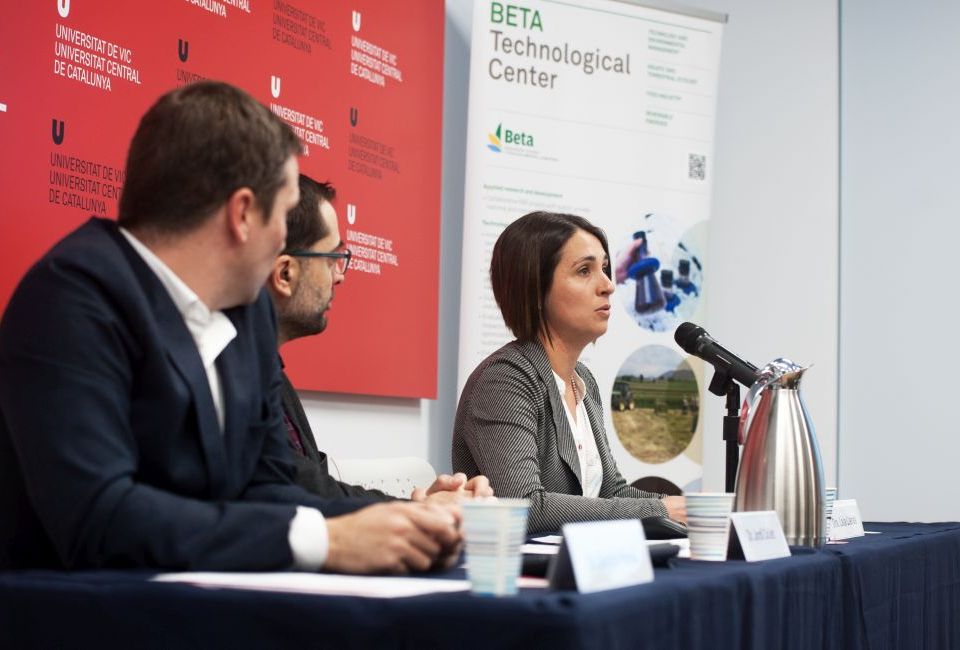
Sergio Ponsá: "The BETA aims to carry out high quality research aimed at the surrounding area, rather than grow in resources"
The BETA Technology Centre (Biodiversity, Ecology and Technology, and Environmental and Food Management) at the University of Vic - Central University of Catalonia (UVic-UCC) has experienced exponential growth in just five years, since its inauguration on 14 November 2014. From initial revenues amounting to less than 200,000 euros, it will end 2019 with more than 1.3 million euros, and more than 2 million euros are forecast for 2020. The centre allocates these sums to "increasingly higher quality science, research and innovation," based on criteria of environmental sustainability, and work in the fields of the food industry and the environment.
These developments were presented this morning by Sergio Ponsá, director of the BETA Technology Centre, at the press conference held at the UVic-UCC Rector's Office to mark the research centre's fifth anniversary. "Our aim is not to grow in terms of numbers, but to consolidate our centre's model and high quality research that brings competitiveness and benefits to the surrounding area," Ponsá explained, and said that "quantitative growth is a consequence of the work done" in three fields of expertise: the development of environmental technologies and sustainability; the mitigation of ecological impacts and the conservation of aquatic and terrestrial biodiversity; and agrarian and agro-industrial systems.
In terms of its personnel, the centre began with 2 doctors and 3 technicians, and today its team amounts to 40 people, of whom 22 are doctors. Just over half of this team consists of people from Catalonia, while the rest come from elsewhere in Spain and other countries in Europe, Asia, Africa and South America, as well as the United States.
According to Ponsá, the keys to these achievements have been undertaking in "highly competitive research that is focused on the real needs of society, which has positioned us internationally, which means we are able to innovate in the territory, with local companies and institutions," with which "it is important to have a relationship of trust because they can genuinely convey the real needs of each sector."
Participation in fifteen European projects and coordinators of five
One of the goals of the CT BETA over the past five years has been to "establish links and create a powerful working network" with leading European organisations, institutions and companies in their areas of expertise. This has led it to participate in a total of 15 European research projects in leading programmes including Horizon 2020, Life, Interreg and ENI CBC MED, and it has acted as coordinator in five of them.
Some of these projects were outlined at this morning's press conference, such as Life DEMINE, which has a total budget of 2,184,632 euros, and aims to address "the problems of environmental pollution, especially in rivers, caused by abandoned salt and metal mines by developing an innovative technology based on membrane and electrocoagulation processes", explained the deputy director of the CT BETA, Laia Llenas. "The results of the project could provide possible solutions to the environmental and ecological impacts of salt and potash mines in Central Catalonia."
The technology centre's projects also include the ENI CBC MED DECOST, which is now being launched with a total budget of more than 3 million euros. Its objective is to implement "a new management framework for urban organic waste, involving community composting systems integrated with urban agriculture" and to "close the management cycle of this fraction in municipalities." The project, involving countries located along the entire Mediterranean coast, will have two pilot tests in Osona.
The press conference also presented the project H2020 FERTIMANURE (8,419,670 million euros), in which BETA is coordinating 21 partners in order to "develop, integrate, test and validate new strategies for recovering nutrients from livestock manure, to obtain tailor-made biological fertilisers that can compete in today's fertilisers market"; and Interreg MED Green Growth," a thematic community of 14 projects promoting sustainable development in the Mediterranean, which recently received recognition from the Union for the Mediterranean."
In Catalonia, the CT BETA is a member of the TECNIO Catalonia network, has 15 knowledge transfer projects under way in the country (which amounts to more than 50 over the past 5 years), is involved in several clusters, and works with five ministries of the Government of Catalonia, as well as with other Catalan government bodies. Based on these figures, Sergio Ponsá acknowledged that "when we started, we could not in our wildest dreams have imagined reaching the point we are at now, and particularly in such a short time."
The spearhead for research at UVic-UCC
The vice-rector for Research and Knowledge Transfer at UVic-UCC, Jordi Collet, explained that the creation of the BETA in 2014 was the result of a "very clear commitment but also an uncertain one, to the research that the University did a decade ago and which has provided very good results." Today (in the 2018-2019 academic year), the BETA Technology Centre accounts for 54% of the competitive funds obtained by the institution in research. The vice-rector emphasised "its major territorial impact, which enables UVic-UCC to support and contribute to addressing important and worrying challenges in the territory, such as climate change and the management of water and slurry."